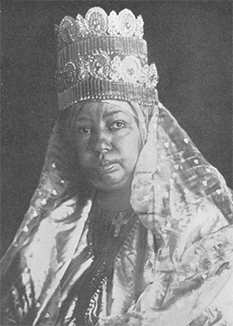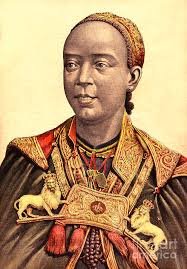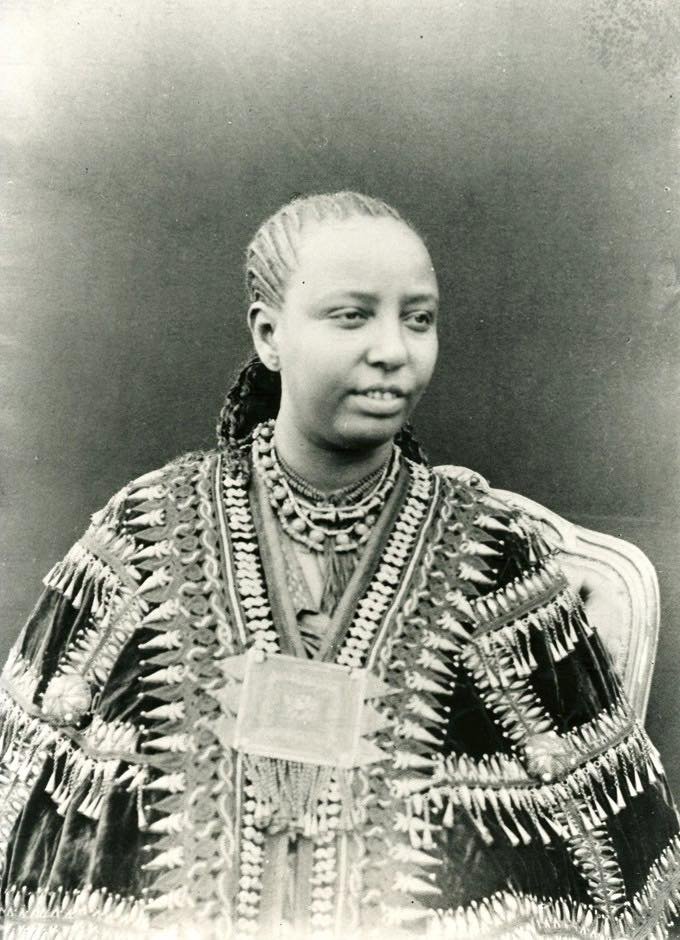Taytu Betul was baptized as Wälättä Mikael. She was Empress of Ethiopia from 1889 to 1913 and the third wife of Emperor Menelik II. An influential figure in the anti-colonial resistance during the late 19th-century Scramble for Africa, she, along with her husband, founded the modern Ethiopian capital Addis Ababa in 1886.
According to Raymond Jonas, Taytu Betul (or Taitu) was born in Semien, North Gondar, Ethiopian Empire.
Taytu’s father, Ras Betul Haile Maryam, was part of the ruling family of Semien that claimed to be descendants of the Solomonic Dynasty through Emperor Susenyos I. Taytu’s uncle was the Amhara warlord Wube Haile Maryam who governed the Semien and Tigray princedom.

There are no records indicating that Empress Taytu attended school; however, she was taught to read and write in Amharic and Ge’ez. This is a rarity, considering that it was unlikely for women to be educated at the time. It is believed that she was taught diplomacy, politics and economics. Additionally, she understood a language once exclusive to the Ethiopian Orthodox liturgy.
Empress Taytu was known to play the begena, which is a 10-string instrument. Her other activities included playing ‘Senterej’, Ethiopian chess, and had an interest in writing poetry.
Taytu was of Lasta, Yejju and Tigray descent, her family is claimed to have a ruling foothold in the Northern region of the country. Such places include: Semien, Begemeder, Lasta, Yejju, Wello and Tigray. Her aristocratic lineage dates back to 1607–32, descending from the daughter of Emperor Susneyos. Her great-grandfather, Ras Gebre of Simien, ruled for 44 years during the period known as the Zemene Mesafint, or the “Era of the Princes”. His fame was acknowledged through two measures. He was responsible for making the communities west of Gondar pay taxes in gold, as well as treating his subjects so well – providing an ample amount of food and drink so that they no longer needed to farm to sustain themselves. Her grandfather, Dejazmach Haile Maryam Gebre, also held a respected title. He governed Simien, where his children Wube, Betul and Merso were born. Additionally, her uncle Degazmach Wube followed in the family’s footsteps by also acquiring a high position in the region. As the half-brother of Taytu’s father, Degazmach Wube was responsible for ruling the Tigray province. Taytu had two brothers (Ras Welle Betul & Temru Betul) and two sisters.
Taytu is acknowledged to have wielded considerable political power both before and after she and Menelik were crowned Emperor and Empress in 1889. She led the conservative faction at court that resisted the modernists and progressives who wanted to develop Ethiopia along western lines and bring modernity to the country. According to the historians, she was always consulted by the Emperor prior to making important decisions. Thus, Empress Taytu was a key player in the conflict over the Treaty of Wuchale with Italy, which she tore up. Empress Taytu was the first to motivate the hesitant Emperor and other men to stand up against the Italians. Deeply suspicious of European intentions towards Ethiopia, she was a key player in the conflict over the Treaty of Wuchale with Italy, in which the Italian version made Ethiopia an Italian protectorate, while the Amharic version did not do so. The Empress held a hard line against the Italians, and when talks eventually broke down, and Italy invaded the Empire from its Eritrean colony, she marched north with the Emperor and the Imperial Army, commanding a force of cannoneers at the historic Battle of Adwa that resulted in a humiliating defeat for Italy in March 1896. This victory was the most significant of any African army battling European colonialism. Menelik II and Taytu Betul were temporarily in possession of 4,000 prisoners of war.
Menelik, who often prevaricated and postponed unpleasant decisions by answering “Yes, tomorrow” (Ishi, nega), found it useful to have his wife be in a powerful enough position to say “Absolutely not” (Imbi) to people and issues he just did not want to personally offend or refuse.

When Menelik’s health began to decline around 1906, Empress Taytu began to make decisions on his behalf, angering her rivals for power through her appointment of favorites and relatives to most of the positions of power and influence. As a means to curb her family’s political influence at court, Menelik selected Sabla Wangel Hailu as the heir-presumptive Lij Iyasu’s wife, as her family had no ties to Taytu’s.
Empress Taytu was widely resented for her alleged Gonderine xenophobia and nepotism, and the nobility of Shoa and Tigray, along with the Wollo relatives of Lij Iyasu conspired to remove her from state responsibility. In 1910, she was forced from power, and a regency under Ras Tessema Nadew took over. Instructed to limit herself to the care of her stricken husband, Taytu faded from the political scene. Taytu and Menelik did not have any children. Menelik died in 1913 and was succeeded by his grandson from a daughter of a previous liaison, Lij Iyasu. Taytu was banished to the old Palace at Entoto, next to the St. Mary’s church she had founded years before, and where her husband had been crowned Emperor.
While some believe Taytu may have played a part in the plot that eventually removed Emperor Iyasu V from the throne in 1916, replacing him with Empress Zauditu, the price for Zauditu’s elevation was a divorce from Taytu’s nephew Ras Gugsa Welle, who became governor of Begemder. Zauditu, Menelik II’s daughter by yet another previous marriage, had always been close to Empress Taytu and invited Taytu to live with her. Although Taytu declined she resumed advising rulers “in a modest way,” to quote Chris Prouty.
She was raised in an aristocratic family. She was church-educated and is said to have excelled to the heights of composing traditional oral Qene poetry. After four failed marriages to important personages, she married Menelik when he was the ruler of Shewa. When Menelik became the emperor of Ethiopia in 1889, she became the empress of Ethiopia two days later with the regal title of “Etege Taytu Betul, Light of Ethiopia.” She was barren, but a good step-mother to Zewditu, the daughter of Menelik begotten from his first wife, and whom she tried to help ascend the throne in her last days.
Empress Taytu Betul understood internal and foreign politics. She counseled the emperor on the devious notions of the colonialists. The Emperor consulted her before he passed a decision on key governance issues.
Empress Taytu played a significant role in the process of unification [of Ethiopia]. She clarified issues for Menelik, and she had an individuality and warmth as a woman that was rarely seen by foreigners. Combined with her compassionate nature was her passion and resolve to safeguard her country’s independence and history.
Of all the good qualities for which Empress Taytu is credited, her dedication to the emperor during the crisis that followed the dispute over the Wichale Treaty stands out. The supposed Italo-Ethiopian Treaty of Friendship and Commerce was discovered to include in Article 17 the intention of Italy to make Ethiopia a protectorate. This infuriated Taytu. During the course of the deliberations, the empress demonstrated considerable indignation and determination to oust the Italians of Ethiopian territories. As tension mounted, the empress persuaded the emperor to declare war against Italy. This culminated in the 1896 Battle of Adwa.
Count Pietro Antonelli, the lead negotiator is said to have remarked, “Menelik is playing games on me by giving up his regal authority to a woman.” To this the empress issued a retort,
“My womanliness and your manliness is going to be tested on the battle field. Do not absent yourself!”
Stay tuned for the continuation on this great story of Empress Taytu Betul…




